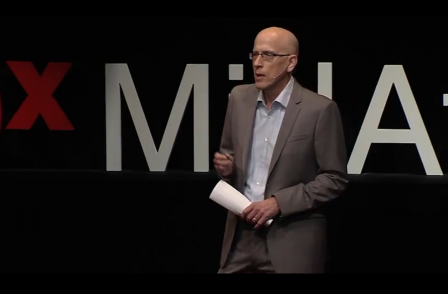It is more than seven years since Will Lewis announced the integration of print and digital at the Telegraph as the UK's top-selling 'quality' national newspaper moved to new offices in Victoria.
Editors from around the world came to gaze at the impressive-looking open plan 'hub' newsroom layout: the central conference desk surrounded by editorial spokes of desks with glass-fronted TV studies on the perimeter and a video wall displaying the most-read online stories.
Last week the Telegraph's editor-in-chief Jason Seiken detailed his own online revolution – turning the title into Fleet Street's first "digital native" news operation.
So was Will having us on? Or has there been some backsliding since his abrupt exit in May 2010 from his job of managing director, digital?
Seiken evidently believes that the Telegraph is not nearly focused enough on the digital side of things.
But perhaps the most telling part of his speech at the Shift conference in London last week (read it in full here) was his belief that the era of the top-down editor-in-chief is over.
This, as much as anything, explains his decision to dispense with the services of Daily Telegraph editor Tony Gallagher in January this year. I am told that former Daily Mail executive Gallagher was a fan of that paper's forthright managerial approach. As someone explained it to me, journalists saw their job as being to please Tony – rather than the reader.
Content from our partners
This sort of approach won't do under Seiken who sets great store by making use of the huge volume of data available in the digital age to find out what readers and viewers want:
If you aren’t using data to listen to your customers, your competitors are…
A top-down, command-and-control style can’t grow today’s newspaper because no one person has the skills in print, audio, video, interactives, data, text, mobile, social, SEO, analytics, infographics, blogging, clickthrough rates, click-to-open rates, conversion rates, subscriber rates, bounce rates, time spent, revenue per page, yields, lifetime value, latency, cost of acquisition, content syndication deals, apps, native advertising, acquisition opportunities, computers, phones, tablets, TV monitors, wearable computers, virtual reality goggles, and … the Apple iCerebellum brain implant or whatever technology is coming next.
The choices are too broad and complex, and the expertise required in each discipline is too deep."
The Telegraph wants to recruit top people with expertise in the above disciplines. And my understanding is that there is a feeling that the best of the new media types, the chaps with bushy beards and stripy t-shirts, won't tolerate a Daily Mail-style 'command and control' atmosphere.
Seiken's first hire at the Telegraph was Lewis Whyld, who makes video drone aircraft and who invented his own 360-degree camera. Watching Whyld's video presentation in the middle of Seiken's address it would have taken a hard-hearted hack indeed not to feel a sense of wonder and excitement at what is made possible by new technology. Whyld creates cinematic-style aerial videos which take the viewer into places which would have been impossible (or at least prohibitively expensive) just a few years ago.
My view is that journalism needs visionaries. But while Seiken's big picture vision was great, he was short on detail about how the journey into journalism's new "golden age" was going to be achieved. To be fair, he has only been in the job full-time since the end of November and maybe the detail isn't there yet (also, he is hardly likely to share everything with his competitors).
Bringing out a daily newspaper and the UK's third biggest national newspaper website is an intensive job. The question is how you bring about a digital revolution whilst continuing to provides readers in print and online with the level of service they know and love.
The medium may be changing all the time – but stories remain the Telegraph's most important commodity and finding that content requires the same focus and energy however you are communicating them.
In less turbulent times (around 2005) then Daily Telegraph editor Martin Newland told me the title was like a supertanker. With a huge effort its course could be altered slightly but essentially it kept ploughing onwards. Back then being an unstoppable giant was seen as a positive. Nowadays, when a news and entertainment website like Buzzfeed can grow from nothing to more than double the traffic of the Telegraph in seven years, agility is seen as being more important than size for a media company.
The question is, can Seiken turn his supertanker into a superyacht or whatever – which is capable of moving quickly enough to keep up with new digital competitors?
Intriguingly there is no word yet (a year on) from Telegraph Media Group as to whether the metered website paywall has been a success or failure. Since April last year those wishing to access more than 20 articles a month on Telegraph.co.uk have been required to take out a subscription at the modest rate of £1.99 a month. Since then traffic for the site has continued to grow, albeit at a much slower rate than that of its national newspaper competitors.
In February, daily browsers for Telegraph.co.uk rose by 4.6 per cent year on year to 3.2m a day versus growth at Guardian.com of 17.5 per cent to 5.4m. Seiken told us last week that Telegraph traffic in March grew 29 per cent year on year to 72m unique browsers, a sharp increase in the rate of growth.
He said last week: "any true digital organisation knows the key to innovation lies in taking risks, failing fast, and learning from those failures."
I wonder if the Telegraph's metered paywall will be the first of those failures that he has to learn from?
Email pged@pressgazette.co.uk to point out mistakes, provide story tips or send in a letter for publication on our "Letters Page" blog








